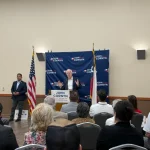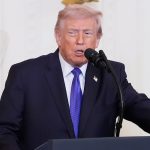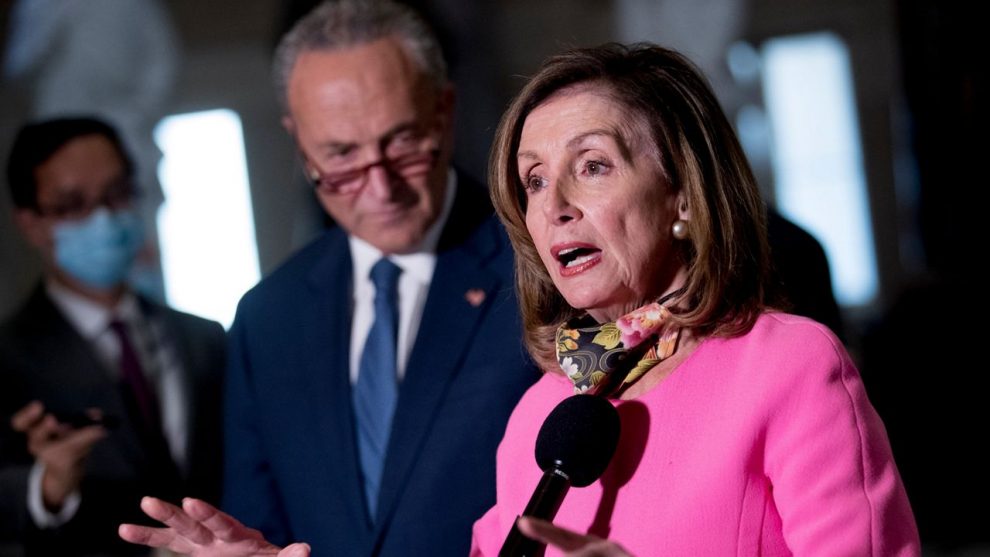The stunning news that President Trump has contracted COVID-19 has ignited a new urgency for Congress to come together on another massive package of emergency coronavirus relief.
The extraordinary development jolted Capitol Hill, fueling the often partisan debate over the severity of the viral threat and intensifying calls for another infusion of emergency aid.
“This kind of changes the dynamic because here they see the reality of what we have been saying all along: This is a vicious virus, and it spreads,” Speaker Nancy Pelosi (D-Calif.) said during an appearance on MSNBC on Friday.
Even Senate Majority Leader Mitch McConnell (R-Ky.), who for weeks has downplayed the chances of reaching an agreement, was offering a more bullish tone Friday.
“I’m trying to figure out here whether I should predict another bill quickly or not. But the talks have speeded up in the last couple of days,” he said during an event in Kentucky. “I think we’re closer to getting an outcome.”
Not everyone is so confident. House lawmakers raced out of town on Friday for a six-week recess without reaching a bipartisan agreement on any new stimulus, and many were pessimistic that, after weeks of stalled talks, any such deal will materialize before the Nov. 3 elections.
“I don’t think this changes anything,” said Rep. Tony Cárdenas (D-Calif.).
Trump’s diagnosis, announced in the early hours of Friday, has sent shockwaves across the country, upending the presidential election, rattling Wall Street and creating new waves of jittery Americans racing to get coronavirus tests. On Friday afternoon, the president was ushered to Walter Reed Medical Center in Maryland for treatment via Marine One.
For some of those advocating the loudest for a bipartisan agreement, the president’s illness sparked new hopes that the sides will reach an elusive deal.
“Time will tell, but I think if anything, it might actually be that final dose of inspiration necessary to bring both sides together and ensure something gets done,” said Rep. Dean Phillips (D-Minn.), a member of the Problem Solvers who’s been pressing Democratic leaders to compromise on a package that can win bipartisan support.
Upping the pressure on Pelosi, the moderate Blue Dog Democrats sent a letter Friday urging her “to continue the discussions over the weekend until a deal is achieved.”
“By definition, this compromise bill will contain provisions we as Democrats do not like and omit provisions we want,” the group wrote. “But our country is in crisis, and we must not let the perfect become the enemy of the good.”
In many respects, the business and rhetoric of Capitol Hill appeared to be unchanged, as the partisan clashes that have prevented an agreement continued to define the debate — and to undermine it.
Democrats sought to use Trump as an example of how disdain for preventative measures — masks, avoiding crowds — can spread the virus. Republicans raced to Trump’s defense, rejecting any notion that the president had acted irresponsibly. And House lawmakers headed home without voting on emergency legislation that can win Trump’s signature.
Indeed, many lawmakers predicted that Trump’s diagnosis would do nothing to break the stalemate between Pelosi and Treasury Secretary Steven Mnuchin, the two leaders scrambling for a deal.
“I don’t see how there’s going to be much of a change here,” said Rep. Scott Peters (D-Calif.).
The Trump diagnosis capped a wild week of bipartisan negotiations on a relief package. Pelosi and Mnuchin held a flurry of phone calls, including a lengthy 65-minute call on Friday afternoon — a sign that the two sides were still working toward a deal even as lawmakers dashed down the Capitol steps to catch flights home so they could return to the campaign trail.
“I’m optimistic. I’m always optimistic,” Pelosi told MSNBC’s Stephanie Ruhle. “We always have to find a path. That is our responsibility to do so, and I believe that we will.”
On Thursday, House Democrats had approved a $2.2 trillion stimulus bill, though it was rejected by every Republican and 18 moderate Democrats frustrated to be voting on legislation with no chance of being enacted. Mnuchin has offered a $1.6 trillion counter-proposal, but even that figure is likely to scare away Republicans in the Senate, where McConnell has warned that a White House endorsement is no guarantee the bill will be considered.
Friday’s conversation between Pelosi and Mnuchin followed a pair of calls Thursday and a 90-minute in-person meeting in the Capitol on Wednesday that raised questions about whether the key negotiators may have been exposed to the virus since Mnuchin frequently sees Trump. But spokespeople for both Pelosi, who is second in line to the presidency, and Mnuchin, who is fifth in line, said Friday that both had tested negative.
Still, the new outbreak touched all aspects of the nation’s capital on Friday. Around noon, the normally quiet COVID-19 testing site outside the National Building Museum had about 50 people standing in line for a nasal swab. At least three journalists who work at the White House tested positive for COVID-19, according to the White House Correspondents Association.
And Sens. Mike Lee (R-Utah) and Thom Tillis (R-N.C.), Judiciary Committee members who had attended a Rose Garden ceremony last weekend where Trump announced his new Supreme Court pick, said they had tested positive.
Although House lawmakers headed for the exits on Friday, Majority Leader Steny Hoyer (D-Md.) told them to be prepared at any time to return to the Capitol in the event an agreement emerges.
Complicating the pathway to a deal, neither side seems to trust the other to be an honest broker. Republicans have hammered Pelosi throughout the talks, accusing her of consistently changing the goalposts in order to prevent billions of dollars from going out the door, which could help Trump’s reelection bid.
“Pelosi has no real intention of reaching an agreement before the election,” Rep. Jason Smith (R-Mo.), a member of GOP leadership, told The Hill. “She is doing a superb job of acting like she is trying to cooperate. She deserves an Emmy.”
Across the aisle, Democrats fired back, noting that Trump has taken a decidedly hands-off approach to negotiations, deputizing Mnuchin to haggle the details even as polls show the pandemic — and the president’s response to it — have threatened his reelection bid.
“We just heard Mark Meadows claim — and I say he claimed — that the president told him this morning that, ‘Hey, how are the talks going?’” said Cardenas, referring to Trump’s chief of staff. “If the president was that attentive about these talks we would have cut a deal a long time ago.”
A handful of other Democratic voices, however, joined Pelosi in saying the national focus on Trump’s condition could give a fresh boost of momentum to the sputtering talks.
“I think this puts more into focus the importance of getting a deal to help people to fight COVID. If this doesn’t point out that we are still in the middle of a health crisis and economic crisis, I don’t know what does,” said Problem Solvers Caucus Co-Chair Josh Gottheimer (D-N.J.), whose congressional district outside of New York City was slammed by the virus earlier this year.
“We cannot afford to wait until after the next inauguration to help people; this just reinforces the urgency.”
Freshman Rep. Veronica Escobar (D-Texas), a rising star in the party, said she hopes the Trump and his allies on Capitol Hill take this opportunity to reflect on how millions of Americans are coping “without the benefit of great healthcare, the ability to convalesce at home, the ability to retain a paycheck.”
“People are struggling, people are dying, and I wish the president and first lady a speedy recovery. I hope it doesn’t hit them as hard as it’s afflicted so many,” Escobar told The Hill. “But I hope that this brings a little compassion to the hearts of those who need it: my Republican colleagues who prioritize the wealthiest Americans above the neediest.”
Story cited here.
























